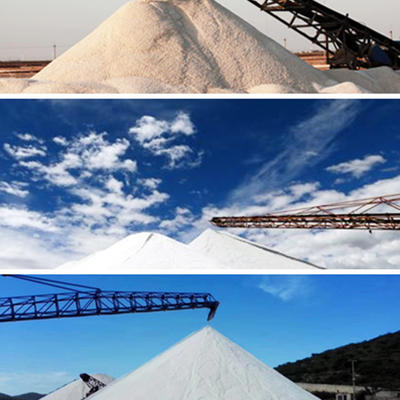In recent years, as people's requirements for water quality continue to increase, water softeners are increasingly used in households and industries. In this process, industrial salt, as an important part of the water softener, plays a vital role.

What is industrial salt?
Industrial salt, as the name suggests, is salt specially used for industrial purposes. Unlike table salt, industrial salt undergoes specific processing and treatment to remove impurities, making it efficient and safe for use in a variety of industrial applications. In water softeners, the main function of industrial salt is to remove calcium and magnesium ions in the water through the ion exchange process, prevent scaling, and improve water quality.
Applications in water softeners
A water softener is a device that softens water by removing minerals such as calcium and magnesium from hard water. Hard water will not only affect the washing effect in daily life, but also cause serious scaling problems on pipes and household appliances, reducing their service life and efficiency. Industrial salt mainly plays a role in water softeners through the following aspects:
1. Ion exchange: The sodium ions in the industrial salt exchange with the calcium and magnesium ions in the water to remove the hardness components in the water. This process effectively prevents scaling problems and protects the normal operation of pipelines and equipment.
2. Regeneration: After the water softener has been working for a period of time, it needs to restore its ion exchange capacity through the regeneration process. Industrial salt releases a large amount of sodium ions during the regeneration process, helping the water softener restore its function and ensuring its long-term efficient operation.
3. Improve water quality: Using soft water treated with industrial salt can not only improve the washing effect, but also reduce the consumption of soap and detergent, saving household expenses. In addition, soft water is also kinder to the skin and hair, bringing a more comfortable living experience.
Advantages of industrial salt
The use of industrial salt in water softeners offers significant advantages over other types of salt. First of all, industrial salt has high purity and low impurity content, which can effectively reduce equipment maintenance needs. Secondly, industrial salt is relatively cheap and has low cost of use, making it an economical choice. Furthermore, the industrial salt particles are uniform and the dissolution rate is moderate, which can ensure the stable operation of the water softener.
Environmental protection and safety
It is worth noting that although industrial salt plays an important role in the water softening process, its use also requires attention to environmental protection and safety issues. Excessive use of industrial salt may cause environmental pollution, so it needs to be used scientifically and rationally. In addition, choose high-quality industrial salt produced by regular manufacturers to ensure that it meets relevant standards and regulations and ensures safe use.
In short, the application of industrial salt in water softeners not only improves water quality and quality of life, but also protects the normal operation of pipelines and household appliances. Today, as water quality requirements continue to increase, industrial salt, as an important component of water softeners, its role and value cannot be ignored. With the continuous advancement of technology and the enhancement of environmental awareness, it is believed that the application of industrial salt in the field of water treatment will be more extensive and efficient, bringing people a better water resource experience.